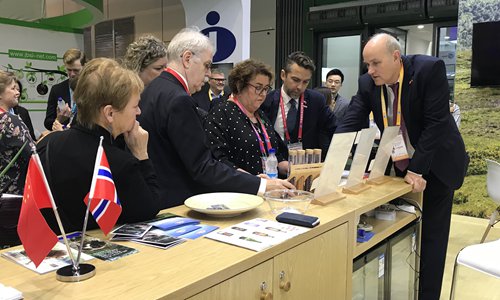HOME >> BUSINESS
Norwegian agricultural products find their way into the Chinese market
By Du Qiongfang in Shanghai Source:Global Times Published: 2019/11/6 19:53:42

Norwegian Minister of Agriculture and Food Olaug Vervik Bollestad (center) listens to a Norwegian exhibitor introducing the products at the second CIIE. Photo: Courtesy of the Consulate General of Norway in Shanghai
Entering the large Chinese market is an opportunity that Norwegian firms do not want to miss out on, particularly with the nation's consumption upgrades, Norwegian officials and business representatives told the Global Times.
Leading a delegation of about 30 companies to participate in the second China International Import Expo (CIIE), Norwegian Minister of Agriculture and Food Olaug Vervik Bollestad said on Tuesday, expressing the hope that China and Norway can maintain robust trade and economic relations in the future.
The Norwegian Seafood Council (NSC) revealed last week that China has become the fastest-growing market for Norwegian seafood this year. Statistics from the NSC showed that Norway's salmon exports to China have hit almost 20,000 tons to date, up 90 percent from last year. As of the end of the third quarter, Norwegian seafood exports to China totaled nearly 112,000 tons, an increase of 14 percent year-on-year, official data showed.
Norwegian exporters of other foods and agricultural products also see great opportunities in the Chinese market.
This year, almost half of the 28 Norwegian exhibitors, which showcased products ranging from agriculture and food to medical equipment and health care products, come from the agriculture and food sector. Many of them are participating in the CIIE for the first time.
TINE SA, Norway's largest producer, distributer and exporter of dairy products, was one of the first to come to the CIIE. Although TINE is a renowned brand in the Nordic country, the company's dairy products have never featured on Chinese consumers' tables before. The company has spoken with different firms and hopes to find potential Chinese partners through the CIIE.
"We are on the way to getting to know China and Chinese people's eating habits, and we will see if there is the possibility for TINE to do business in China," said Jan-Ole Pedersen, export manager of TINE SA.
Since the Chinese market is expansive and full of opportunities, many foreign dairy brands entered the market a long time ago. But according to Pedersen, Norway produces the tastiest meat in the world with the use of the lowest quantities of antibiotics and chemicals. As such, TINE's dairy products have their advantages compared with similar products from around the world.
"The market is still developing in the dairy sector. The specialty of Norway is the quality. We have the feeling that quality is something desirable for Chinese consumers," said Pedersen, whose company has brought dairy products such as cheese, UHT milk, yogurt and coffee to the second CIIE.
Bollestad also noted that good animal health and healthcare are important not only for the animals, but also for humans' health. As for the pricing of Norwegian food, Bollestad thinks that since salmon is affordable to Chinese people, pigs and other foods will also be affordable.
Aass is a Norwegian beer which is produced by Norway's longest-standing brewery. The beer was shown at last year's CIIE and received a positive response from the Chinese market, Ozzie Xu, general manager of the brand's Chinese sales, told the Global Times.
"Norwegian companies haven't expanded swiftly in the Chinese market. When I suggested that the Norwegian beer participate in the first CIIE last year, the company actually hesitated. When I told them the business opportunities and statistics about China, they didn't have any concept of them," said Xu, noting that after the Norwegian beer was a success in the Chinese market, the company proactively suggested participation in the second CIIE.
The company signed its first Chinese order during the last CIIE and has signed a purchase agreement worth 50 million yuan ($7.14 million) with a logistics company based in Wuhan, Central China's Hubei Province, during the second CIIE.
Xu noted that he is often asked why he exports Norwegian beer to the Chinese market instead of the more well-known German or Belgian beers. "When I think twice, I feel that exporting Norwegian beer has pros and cons. The national label of Norway won't stimulate sales naturally, but there are Norwegian or Nordic communities in Chinese cities such as Shanghai. When they see the beer, it fills them with nostalgia," Xu said.
Posted in: ECONOMY